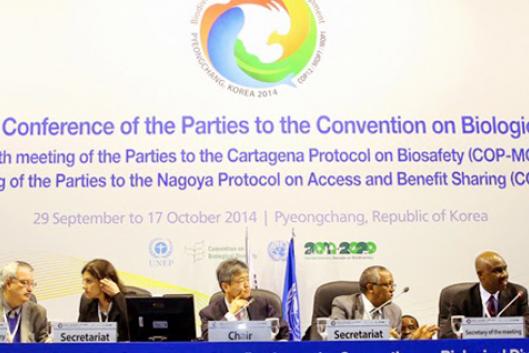Disponível apenas em inglês.
The 12th Conference of the Parties (COP 12) to the Convention on Biological Diversity (CBD) is taking place in South Korea.
There are several issues being addressed by the COP 12 such as biodiversity and ecosystems conservation, invasive species, synthetic biology, benefit sharing from access to genetic resources, biofuels and many others. If you wish to learn more about the discussions taking place and why they are relevant, we would like to invite you to visit the CBD Alliance web site (http://www.cbdalliance.org) where you will be able to read about what is at stake at the COP 12. The CBD Alliance, a group of civil society actors that critically monitor and seek to influence and inform about the CBD, has identified key issues that will be debated at the CBD.
One such issue has to do with Genetically Modified Trees, also called Genetically Engineered (GE) or transgenic trees. During a previous CBD meeting (COP 9) a decision was adopted (IX/5) calling for application of the precautionary approach regarding transgenic trees. It urges parties to strictly apply the precautionary approach and not to authorise the environmental release of GE trees until research can show that any possible negative impact can be ruled out, including impacts on the livelihoods of indigenous peoples and local communities. This international CBD decision has to be followed up and implemented at the national level. Further reading at: http://www.cbdalliance.org/en/images/COP12/Briefing_notesCOP12/Briefing_on_GE_Trees.pdf
However, in countries like Brazil and USA (whose government has never ratified the CDB), corporations have submitted applications to request the commercial release of GE Trees. Indigenous Peoples, civil society organizations and social movements in both countries are raising alarms and urge their governments not to approve those requests, amongst others on the grounds of the CBD decision. Worldwide, several groups are involved in a campaign to Stop GE Trees (see stopgetrees.org).
If you wish to read the letter sent to Brazilian authorities urging them not to authorise the request by a company involved in industrial tree plantations please visit: http://wrm.org.uy/all-campaigns/open-letter-to-be-sent-to-the-brazilian-national-technical-biosafety-commission-ctnbio/
In the USA the Indigenous Environmental Network and Eastern Band of Cherokee community members organized a gathering of Indigenous Peoples from across the Southeastern US for an historic Indigenous Peoples’ action camp against genetically engineered trees (GE trees). Participants condemned GE trees as a form of colonization of the forest. You can read further at:
http://stopgetrees.org/indigenous-peoples-unite-stop-genetically-engineered-trees/
Finally, for those who would like to know what is happening in relation to GE Tree research in countries around the world, we invite you to read the updated WRM publication called: “GE Trees Research. A Country by Country Overview”. It includes information on whether there is research on GE Trees taking place or not in the countries included in the overview, which tree species are being engineered, for which purposes, who is behind the research and what are the risk for the environment and the communities whose livelihoods depend on it. The publication is available at : http://wrm.org.uy/books-and-briefings/ge-tree-research-a-country-by-country-overview/
We hope you find this information useful. Please let us know if you have any question.
The WRM Team
